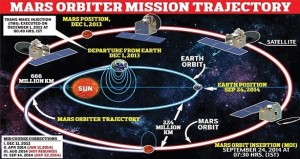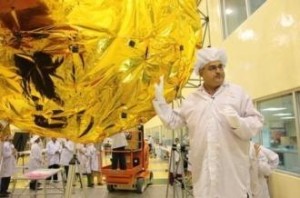India becomes the first country to reach Mars in first attempt
India becomes the first country to reach Mars in first attempt
Posted by: Admin September 25, 2014 64 Views
The longest journey India has ever undertaken is reaching Mars. After more than 300 days, the country’s Mars Orbiter Mission (MOM) is within striking distance of making big global history.
On the morning of September 24, the Indian space programme will make its much-awaited tryst with the Earth’s red neighbour, Mars, with a spacecraft the size of a Tata Nano car, and lovingly called “Mangalyaan” or Mars Craft.
The 1,350kg unmanned robotic satellite will first be slowed down in a tricky manoeuvre to get it caught in the orbit of Mars, a wee bit slower and it would crash-land on the surface of Mars, a wee bit faster and it would miss the red planet to be lost in outer space forever.
The success rate of such complex missions is less than 50 percent and even the US and Russia did not succeed in their maiden attempts.
“India will become the first Asian country to have achieved this and if it happens in the maiden attempt itself, India could become the first country in the world to have reached distant Mars under its own steam in the first attempt,” K Radhakrishnan, the head of the Indian Space Research Organisation (ISRO), said.
This is undisputedly a shining moment in the space exploration history of a country otherwise beset with developmental challenges. Over half a century, the Indian space programme has managed many feats, but none as dramatic as taking an inter-planetary leap, which is what MOM has accomplished.
Partly in keeping with the Asian space race, MOM was conceptualised, planned and implemented by the ISRO in the spirit of a 100m dash and sticking diligently to a shoestring budget of Rs 450 crores or about $74m; a figure that has surprised many across the world, and prompted the country’s newly elected Prime Minister Narendra Modi to suggest that “the Hollywood movie Gravity cost more than our Mars mission – this is a great achievement”.
Cheapest inter-planetary mission
Perhaps the world’s cheapest inter-planetary mission, MOM was a tense, 15-month rollercoaster for the more than 500 engineers and scientists involved. Most global missions take over a decade to execute and cost a lot more, the current and ongoing mission to Mars by NASA called MAVEN has cost around $670m.
Without doubt, the geopolitics is significant too, with the timing helping India race ahead of China in trying to get to Earth’s alluring neighbour. National pride is always a driver for such missions. The journey that began from the Red Fort in old New Delhi to the red planet will help India tell the world it is a space power to reckon with.
Pallava Bagla has been following the development of the spacecraft [Courtesy of Pallava Bagla]
Launched from India’s spaceport of Sriharikota along the eastern coast about 100km north of the southern city of Chennai in November 2013, Mangalyaan was first publicly announced by former Prime Minister Dr Manmohan Singh on August 15, 2012.
This was not an easy decision to take, given the incredible complexities and challenges of inter-planetary missions – the distance, the orbital aerobics, the unknown Martian environment.
In 54 years, the world has mounted almost as many missions to Mars. Since 1960, the world has seen several space missions launched to the red planet, but more than half of these have been failures. The journey is risky and Mars has traditionally been an unfriendly environment for visits by earthly machines!
And no nation – apart from the Mars Express mission, Europe’s maiden venture to Mars representing a consortium of 20 countries of the European Space Agency – has succeeded in its maiden venture.
MOM, obviously became a trial of ISRO’s technological knack for a long journey out beyond the Earth’s gravitational field for the first time. That said, it was always to be more than just that: MOM attempts to also probe some scientific questions, including the most tantalising one of whether we are indeed alone in the universe.
Read Full Story at Alzazeera
 September 27, 2014
·
September 27, 2014
·  admin ·
admin ·  No Comments
No Comments
 Posted in: Universe
Posted in: Universe




Leave a Reply